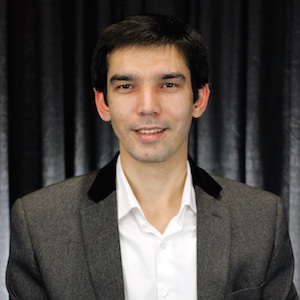NORMAN, OKLA. – Bayram Saparov, an assistant professor in the Department of Chemistry and Biochemistry, University of Oklahoma College of Arts and Sciences, received a Faculty Early Career Development Program (CAREER) award from the National Science Foundation for his project, “Exploring Luminescence in Low-Dimensional Halides.”
Saparov and his research group aim to develop a new type of affordable, easy-to-prepare, earth-abundant and robust luminescent materials based on inexpensive metal halides, which are compounds between metals and halogens. He says the project may introduce new avenues for energy-saving solid-state lighting technologies, like LEDs, which “could reduce lighting energy use by 75% in 2035.”
“Luminescent materials play a major role in modern society owing to their applications in state-of-the-art lamps, television and computer monitors, and medical scanners, as well as to their potential in the fields of optical devices and biomedicine,” Saparov added. “This project has the potential to transform our understanding of the links between the light emission properties and atomic structures of metal halides, which in turn, will allow us to control and manipulate the materials chemistry of halides to prepare custom design light-emitting materials with full range color-tunability.”
Additionally, Saparov’s project will support a Research Experience for High School Students program that provides a two-month research experience for Oklahoma high school students.
“This project will also provide an excellent platform for promoting materials chemistry research and developing a diverse, competitive STEM workforce in Oklahoma through the REHSS program,” Saparov said. “Participants include remote rural schools that are primarily serving minority communities.”
“Professor Bayram Saparov is a thoroughly deserving recipient of the prestigious NSF Career Award,” said David Wrobel, dean of the College of Arts and Sciences. “His research has tremendous potential for significantly reducing lighting energy use. In addition, his plan to expand the research horizons for Oklahoma high school students is as an excellent example of the kind of holistic approach that will help drive and converge the programmatic and research missions of the Department of Chemistry and Biochemistry, the College of Arts and Sciences, and OU long into the future.”
Saparov is also the recipient of a 2020 Early Career Research Award from the U.S. Department of Energy, a program described as working to bolster the nation’s scientific workforce by providing support to exceptional researchers during crucial early career years, when many scientists do their most formative work.


